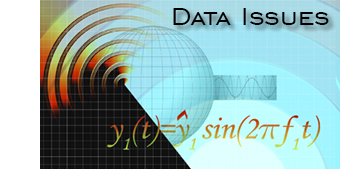 Tracking of known problems and subsequent fixes is an important issue for MODIS data users. This Data Issues section of the website will act as a repository of all known MODIS Atmosphere Data Product problems, as well as how to determine the problematic version (and the fixed version) of the HDF data -- therefore data users should check this page for updates regularly. Data Users unfamiliar with how to properly track problems and fixes by determining the version of their downloaded HDF files should refer to the documentation below.
Tracking of known problems and subsequent fixes is an important issue for MODIS data users. This Data Issues section of the website will act as a repository of all known MODIS Atmosphere Data Product problems, as well as how to determine the problematic version (and the fixed version) of the HDF data -- therefore data users should check this page for updates regularly. Data Users unfamiliar with how to properly track problems and fixes by determining the version of their downloaded HDF files should refer to the documentation below.
Data Issues are organized by individual L2 and L3 Product Files. Users may peruse issues for each Product by clicking on the Product links to the left.
It should be noted that the reprocessing of all MODIS Data to Collection 6.1 was completed in early March 2018. Collection 6.1 is the most advanced and most reliable data produced thus far. All users are encouraged to Order or Download Collection 6.1 MODIS Data.
How to Track MODIS Data File "Versions" (Important for Tracking Problems and Fixes)
Problems and fixes in MODIS Atmosphere Product HDF files can be tracked in one of three ways.
First, the HDF File "Collection Version", which is a broad generation tag can be found in the HDF filename itself (shown in red color below).
Second, the Product Generation Executive Version or "PGE Version", which is stored internally within each HDF file and can be queried from any HDF file using the command:
ncdump -h *.hdf
Finally, the HDF File "Production Date", which is the date the HDF file was actually generated or produced, can be found in the HDF filename itself (shown in green color below).
Note that for the images shown below: 1.) all times are UTC time, not local time; 2.) the DDD in the date denotes the Day of Year (001-366); and 3.) the prefix (MOD06_L2, MOD08_D3, etc.) is only an example (MYD04_L2, MOD05_L2, MYD05_L2, MYD06_L2, etc. ... or MYD08_D3, MOD08_E3, MYD08_E3, MOD08_M3, MYD08_M3 could be substituted).

